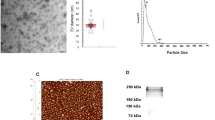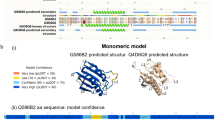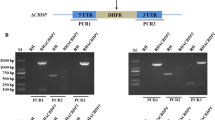Abstract
Trypanosoma cruzi is the etiological agent of Chagas disease, whose clinical outcome ranges from asymptomatic individuals to chronic fatal megasyndromes. Despite being central to pathogenesis, the regulation of parasite virulence factors’ expression remains largely unknown. In this work, the relative expression of several parasite virulence factors between two TcI strains (Ninoa, low virulence and Qro, high virulence) was assessed by qRT-PCR of total and of polysome-associated mRNA, as well as by western blots. Trypomastigotes were also incubated with specific anti-sense morpholino oligonucleotides to block the translation of a selected virulence factor, calreticulin, in both strains. Ninoa trypomastigotes showed significantly lower levels of trypomastigote-decay acceleration factor, complement regulatory protein, complement C2 receptor inhibitor trispanning, and glycoproteins 82 and 90 mRNAs compared with Qro. There was a significantly lower recruitment of complement regulatory protein and complement C2 receptor inhibitor trispanning mRNAs to polysomes and higher recruitment of MASP mRNA to monosomes in Ninoa strain. Calreticulin mRNA displayed both a higher total mRNA level and recruitment to translationally active polysomes in the Ninoa strain (low virulence) than in the Qro strain (high virulence). When calreticulin was downregulated by ≈ 50% by anti-sense morpholino oligonucleotides, a significant decrease of parasite invasion in mammalian cells was found in both strains. Calreticulin downregulation, however, only increased significantly the activation of the complement system by Ninoa trypomastigotes. These results suggest a role for the regulation of virulence factors’ gene expression in the differential virulence among T. cruzi strains. Furthermore, a possible function of calreticulin in parasite invasion not related to its binding to complement factors is shown.





Similar content being viewed by others
References
Alves LR, Oliveira C, Goldenberg S (2015) Eukaryotic translation elongation factor-1 alpha is associated with a specific subset of mRNAs in Trypanosoma cruzi. BMC Microbiol 15:104. https://doi.org/10.1186/s12866-015-0436-2
Arroyo-Olarte RD, Martínez I, Cruz-Rivera M, Mendlovic F, Espinoza B (2018) Complement system contributes to modulate the infectivity of susceptible TcI strains of Trypanosoma cruzi. Mem Inst Oswaldo Cruz 113:e170332. https://doi.org/10.1590/0074-02760170332
Bartholomeu DC, Cerqueira GC, Leão ACA, daRocha WD, Pais FS, Macedo C, Djikeng A, Teixeira SMR, El-Sayed NM (2009) Genomic organization and expression profile of the mucin-associated surface protein (masp) family of the human pathogen Trypanosoma cruzi. Nucleic Acids Res 37:3407–3417. https://doi.org/10.1093/nar/gkp172
Bayer-Santos E, Gentil LG, Cordero EM, Correa PR, Silveira JF (2012) Regulatory elements in the 3′ untranslated region of the GP82 glycoprotein are responsible for its stage-specific expression in Trypanosoma cruzi metacyclic trypomastigotes. Acta Tropica 123. https://doi.org/10.1016/j.actatropica.2012.03.014
Bayer-Santos E, Cunha-E-Silva NL, Yoshida N, Franco Da Silveira J (2013) Expression and cellular trafficking of GP82 and GP90 glycoproteins during Trypanosoma cruzi metacyclogenesis. Parasit Vectors 6:127. https://doi.org/10.1186/1756-3305-6-127
Caler EV, De Avalos SV, Haynes PA, Andrews NW, Burleigh BA (1998) Oligopeptidase B-dependent signaling mediates host cell invasion by Trypanosoma cruzi. EMBO J 17:4975–4986. https://doi.org/10.1093/emboj/17.17.4975
Cassola A (2011) RNA granules living a post-transcriptional life: the trypanosomes’ case. Curr Chem Biol 5:108–117
Chávez-Hernández EC, Alejandri-Ramírez ND, Juárez-González VT, Dinkova TD (2015) Maize miRNA and target regulation in response to hormone depletion and light exposure during somatic embryogenesis. Front Plant Sci 6:555. https://doi.org/10.3389/fpls.2015.00555
Díaz Lozano IM, De Pablos LM, Longhi SA, Zago MP, Schijman AG, Osuna A (2017) Immune complexes in chronic Chagas disease patients are formed by exovesicles from Trypanosoma cruzi carrying the conserved MASP N-terminal region. Sci Rep 7:44451. https://doi.org/10.1038/srep44451
Diosque P, Tomasini N, Lauthier JJ, Messenger LA, Monje Rumi MM, Ragone PG, Alberti-D’Amato AM, Pérez Brandán C, Barnabé C, Tibayrenc M, Lewis MD, Llewellyn MS, Miles MA, Yeo M (2014) Optimized multilocus sequence typing (MLST) scheme for Trypanosoma cruzi. PLoS Negl Trop Dis 8:e3117. https://doi.org/10.1371/journal.pntd.0003117
Docampo R, Huang G (2015) Calcium signaling in trypanosomatid parasites. Cell Calcium 57:194–202
dos Santos SL, Freitas LM, Lobo FP, Rodrigues-Luiz GF, Mendes TA de O, Oliveira ACS, Andrade LO, Chiari E, Gazzinelli RT, Teixeira SMR, Fujiwara RT, Bartholomeu DC (2012) The MASP family of Trypanosoma cruzi: changes in gene expression and antigenic profile during the acute phase of experimental infection. PLoS Negl Trop Dis 6:e1779. https://doi.org/10.1371/journal.pntd.0001779
El-Sayed NM, Myler PJ, Bartholomeu DC, Nilsson D, Aggarwal G, Tran A-N, Ghedin E, Worthey EA, Delcher AL, Blandin G, Westenberger SJ, Caler E, Cerqueira GC, Branche C, Haas B, Anupama A, Arner E, Aslund L, Attipoe P, Bontempi E, Bringaud F, Burton P, Cadag E, Campbell DA, Carrington M, Crabtree J, Darban H, da Silveira JF, de Jong P, Edwards K, Englund PT, Fazelina G, Feldblyum T, Ferella M, Frasch AC, Gull K, Horn D, Hou L, Huang Y, Kindlund E, Klingbeil M, Kluge S, Koo H, Lacerda D, Levin MJ, Lorenzi H, Louie T, Machado CR, McCulloch R, McKenna A, Mizuno Y, Mottram JC, Nelson S, Ochaya S, Osoegawa K, Pai G, Parsons M, Pentony M, Pettersson U, Pop M, Ramirez JL, Rinta J, Robertson L, Salzberg SL, Sanchez DO, Seyler A, Sharma R, Shetty J, Simpson AJ, Sisk E, Tammi MT, Tarleton R, Teixeira S, Van Aken S, Vogt C, Ward PN, Wickstead B, Wortman J, White O, Fraser CM, Stuart KD, Andersson B (2005) The genome sequence of Trypanosoma cruzi, etiologic agent of Chagas disease. Science 309:409–415. https://doi.org/10.1126/science.1112631
Espinoza B, Rico T, Sosa S, Oaxaca E, Vizcaino-Castillo A, Caballero ML, Martínez I (2010) Mexican Trypanosoma cruzi T. cruzi I strains with different degrees of virulence induce diverse humoral and cellular immune responses in a murine experimental infection model. J Biomed Biotechnol 2010:890672–890610. https://doi.org/10.1155/2010/890672
Espinoza B, Solorzano-Domínguez N, Vizcaino-Castillo A, Martínez I, Elias-López AL, Rodríguez-Martínez JA (2011) Gastrointestinal infection with Mexican TcI Trypanosoma cruzi strains: different degrees of colonization and diverse immune responses. Int J Biol Sci 7:1357–1370
Grillo G, Turi A, Licciulli F, Mignone F, Liuni S, Banfi S, Gennarino VA, Horner DS, Pavesi G, Picardi E, Pesole G (2010) UTRdb and UTRsite (RELEASE 2010): a collection of sequences and regulatory motifs of the untranslated regions of eukaryotic mRNAs. Nucleic Acids Res 38:D75–D80. https://doi.org/10.1093/nar/gkp902
Jackson RJ, Hellen CUT, Pestova TV (2010) The mechanism of eukaryotic translation initiation and principles of its regulation. Nat Rev Mol Cell Biol 11:113–127. https://doi.org/10.1038/nrm2838
Lai EC, Burks C, Posakony JW (1998) The K box, a conserved 3’ UTR sequence motif, negatively regulates accumulation of enhancer of split complex transcripts. Development 125:4077–4088
Lambris JD, Ricklin D, Geisbrecht BV (2008) Complement evasion by human pathogens. Nat Rev Microbiol 6:132–142. https://doi.org/10.1038/nrmicro1824
Llewellyn MS, Miles MA, Carrasco HJ, Lewis MD, Yeo M, Vargas J, Torrico F, Diosque P, Valente V, Valente SA, Gaunt MW (2009) Genome-scale multilocus microsatellite typing of Trypanosoma cruzi discrete typing unit I reveals phylogeographic structure and specific genotypes linked to human infection. PLoS Pathog 5:e1000410
López-Olmos V, Pérez-Nasser N, Piñero D, Ortega E, Hernandez R, Espinoza B (1998) Biological characterization and genetic diversity of Mexican isolates of Trypanosoma cruzi. Acta Trop 69:239–254
Maeda FY, Cortez C, Yoshida N (2012) Cell signaling during Trypanosoma cruzi invasion. Front Immunol 3:361. https://doi.org/10.3389/fimmu.2012.00361
Martin DL, Weatherly DB, Laucella SA, Cabinian MA, Crim MT, Sullivan S, Heiges M, Craven SH, Rosenberg CS, Collins MH, Sette A, Postan M, Tarleton RL (2006) CD8+ T-cell responses to Trypanosoma cruzi are highly focused on strain-variant trans-sialidase epitopes. PLoS Pathog 2:e77. https://doi.org/10.1371/journal.ppat.0020077
Martínez I, Nogueda B, Martínez-Hernández F, Espinoza B (2013) Microsatellite and mini-exon analysis of Mexican human DTU I Trypanosoma cruzi strains and their susceptibility to nifurtimox and benznidazole. Vector Borne Zoonotic Dis 13:181–187. https://doi.org/10.1089/vbz.2012.1072
Mendlovic F, Carrillo-Farga J, Torres J, Laclette JP, Flisser A (2006) Differential expression of calreticulin in developmental stages on Taenia solium. J Parasitol 92:789–795. https://doi.org/10.1645/GE-724R1.1
Moreno SN, Docampo R (2003) Calcium regulation in protozoan parasites. Curr Opin Microbiol 6:359–364. https://doi.org/10.1016/S1369-5274(03)00091-2
Muñoz-San Martín C, Zulantay I, Saavedra M, Fuentealba C, Muñoz G, Apt W (2018) Discrete typing units of Trypanosoma cruzi detected by real-time PCR in Chilean patients with chronic Chagas cardiomyopathy. Acta Trop 185:280–284. https://doi.org/10.1016/J.ACTATROPICA.2018.05.004
Orrego PR, Olivares H, Cordero EM, Bressan A, Cortez M, Sagua H, Neira I, González J, da Silveira JF, Yoshida N, Araya JE (2014) A cytoplasmic new catalytic subunit of calcineurin in Trypanosoma cruzi and its molecular and functional characterization. PLoS Negl Trop Dis 8:e2676. https://doi.org/10.1371/journal.pntd.0002676
Osorio L, Ríos I, Gutiérrez B, González J (2012) Virulence factors of Trypanosoma cruzi: who is who? Microbes Infect 14:1390–1402. https://doi.org/10.1016/j.micinf.2012.09.003
Pfaffl MW (2001) A new mathematical model for relative quantification in real-time RT-PCR. Nucleic Acids Res 29:e45
Pfaffl MW, Horgan GW, Dempfle L (2002) Relative expression software tool (REST) for group-wise comparison and statistical analysis of relative expression results in real-time PCR. Nucleic Acids Res 30:e36
Piacenza L, Irigoín F, Alvarez MN, Peluffo G, Taylor MC, Kelly JM, Wilkinson SR, Radi R (2007) Mitochondrial superoxide radicals mediate programmed cell death in Trypanosoma cruzi: cytoprotective action of mitochondrial iron superoxide dismutase overexpression. Biochem J 403:323–334. https://doi.org/10.1042/BJ20061281
Piacenza L, Zago MP, Peluffo G, Alvarez MN, Basombrio MA, Radi R (2009) Enzymes of the antioxidant network as novel determiners of Trypanosoma cruzi virulence. Int J Parasitol 39:1455–1464. https://doi.org/10.1016/j.ijpara.2009.05.010
Piacenza L, Peluffo G, Alvarez MN, Martínez A, Radi R (2013) Trypanosoma cruzi antioxidant enzymes as virulence factors in Chagas disease. Antioxid Redox Signal 19:723–734. https://doi.org/10.1089/ars.2012.4618
Ramírez G, Valck C, Molina MC, Ribeiro CH, López N, Sánchez G, Ferreira VP, Billetta R, Aguilar L, Maldonado I, Cattán P, Schwaeble W, Ferreira A (2011) Trypanosoma cruzi calreticulin: a novel virulence factor that binds complement C1 on the parasite surface and promotes infectivity. Immunobiology 216:265–273. https://doi.org/10.1016/j.imbio.2010.04.001
Rodrigues JPF, Takahashi Sant’ana GH, Juliano MA, Yoshida N (2017) Inhibition of host cell lysosome spreading by Trypanosoma cruzi metacyclic stage-specific surface molecule gp90 downregulates parasite invasion. Infect Immun 85:e00302–e00317. https://doi.org/10.1128/IAI.00302-17
Rosenberg CS, Zhang W, Bustamante JM, Tarleton RL (2016) Long-term immunity to Trypanosoma cruzi in the absence of immunodominant trans-sialidase-specific CD8 + T cells. Infect Immun 84:2627–2638. https://doi.org/10.1128/IAI.00241-16
Santi-Rocca J, Fernandez-Cortes F, Chillón-Marinas C, González-Rubio M-L, Martin D, Gironès N, Fresno M (2017) A multi-parametric analysis of Trypanosoma cruzi infection: common pathophysiologic patterns beyond extreme heterogeneity of host responses. Sci Rep 7:8893. https://doi.org/10.1038/s41598-017-08086-8
Smircich P, Eastman G, Bispo S, Duhagon MA, Guerra-Slompo EP, Garat B, Goldenberg S, Munroe DJ, Dallagiovanna B, Holetz F, Sotelo-Silveira JR (2015) Ribosome profiling reveals translation control as a key mechanism generating differential gene expression in Trypanosoma cruzi. BMC Genomics 16:443. https://doi.org/10.1186/s12864-015-1563-8
Tzelepis F, de Alencar BCG, Penido MLO, Claser C, Machado AV, Bruna-Romero O, Gazzinelli RT, Rodrigues MM (2008) Infection with Trypanosoma cruzi restricts the repertoire of parasite-specific CD8+ T cells leading to immunodominance. J Immunol 180:1737–1748
Wippel HH, Malgarin JS, Martins S de T, Vidal NM, Marcon BH, Miot HT, Marchini FK, Goldenberg S, Alves LR (2019) The nuclear RNA-binding protein RBSR1 interactome in Trypanosoma cruzi. J Eukaryot Microbiol 66:244–253. https://doi.org/10.1111/jeu.12666
Yoshida N, Cortez M (2008) Trypanosoma cruzi: parasite and host cell signaling during the invasion process. Subcell Biochem 47:82–91. https://doi.org/10.1007/978-0-387-78267-6_6
Zago MP, Hosakote YM, Koo S j, Dhiman M, Piñeyro MD, Parodi-Talice A, Basombrio MA, Robello C, Gargc NJ (2016) TcI isolates of Trypanosoma cruzi exploit the antioxidant network for enhanced intracellular survival in macrophages and virulence in mice. Infect Immun 84:1842–1856. https://doi.org/10.1128/IAI.00193-16
Acknowledgments
We thank Mayra Cruz-Rivera for her kind donation of TsCRT antibody. We also thank Dr. Alberto Pizaña for his generous guinea pig donations.
Funding
Funding was provided by grant PAPIIT IN208417 from DGAPA, Universidad Nacional Autónoma de México.
Author information
Authors and Affiliations
Corresponding author
Ethics declarations
All animals utilized for this project were anesthetized and sacrificed in accordance with the norm issued by the National Autonomous University of Mexico in their Animal Care guidelines (http://www.biomedicas.unam.mx/wp-content/pdf/intranet/reglamentos/codigo-etico-iibo.pdf?x21431) and the official Mexican standard NOM-062-ZOO-1999. This project was approved by the Committee for the Care and Use of laboratory animals (Instituto de Investigaciones Biomedicas, Universidad Nacional Autonoma de Mexico).
Conflict of interest
The authors declare that they have no conflict of interest.
Additional information
Section Editor: Panagiotis Karanis
Publisher’s note
Springer Nature remains neutral with regard to jurisdictional claims in published maps and institutional affiliations.
Electronic supplementary material
ESM 1
(DOCX 16 kb)
Rights and permissions
About this article
Cite this article
Arroyo-Olarte, R.D., Martínez, I., Lujan, E. et al. Differential gene expression of virulence factors modulates infectivity of TcI Trypanosoma cruzi strains. Parasitol Res 119, 3803–3815 (2020). https://doi.org/10.1007/s00436-020-06891-1
Received:
Accepted:
Published:
Issue Date:
DOI: https://doi.org/10.1007/s00436-020-06891-1




